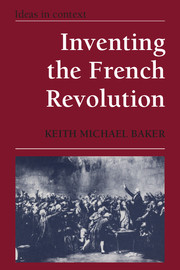1 - On the problem of the ideological origins of the French Revolution
Published online by Cambridge University Press: 05 June 2012
Summary
In recent years, intellectual historians have found themselves in an ironic position. Once under sentence of confinement to the scholastic irrelevance of the superstructure, they have seen the base–superstructure distinction almost entirely abandoned in modern social thought. Once threatened by the imperialism of behavioral social science among historians, they have witnessed a reorientation of the social sciences generally toward problems of meaning. They have watched those who dismissed ideas as the most ephemeral of appearances – and the history of ideas as a narrative cobweb to be swept away by the Annalistes' broom – rediscover the domain of the event as the play of meanings in human action. Structuralists have offered them the world as a text without history; poststructuralists have threatened them with the specter of history without a text. It is scarcely surprising, then, that intellectual historians have shown some of the disorientation of ghetto dwellers after the walls have been broken down, uncertain whether they have been invaded or liberated.
I can best state my own view by saying that I regard intellectual history as a mode of historical discourse, rather than as a distinct field of inquiry with a clearly demarcated subject matter. It is a way of addressing the past, a certain orientation toward history generally, rather than a separate or autonomous branch of historical scholarship in any strict or categorical sense.
- Type
- Chapter
- Information
- Inventing the French RevolutionEssays on French Political Culture in the Eighteenth Century, pp. 12 - 28Publisher: Cambridge University PressPrint publication year: 1990
- 2
- Cited by

